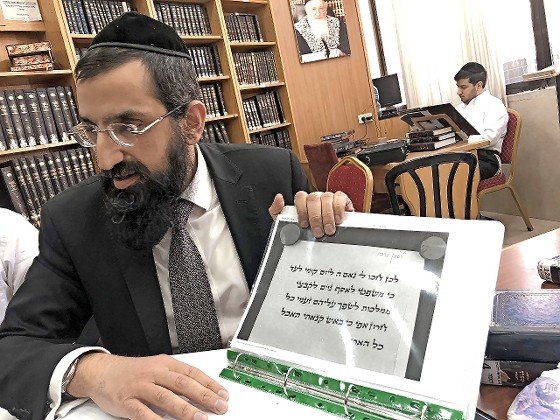Jerusalem center boosts diaspora Torah expertise
In a modest room that serves as a Beit Midrash atop a large synagogue in Jerusalem’s Kiryat Moshe neighborhood, a group of Israel’s leading Torah scholars is pouring over the Talmud, books of halacha and other holy texts.
The Orthodox men studying in this special kollel aren’t doing so just for their personal growth. Rather they are brushing up on their knowledge base of Jewish law so they can spread the information to other rabbis, aspiring rabbis and other individuals who are looking for structured Torah learning from Miami to Melbourne and points in between.
Meet the International Halacha Institute (IHI), an Israeli organization founded three years ago to empower future Jewish leaders around the world. IHI offers personal VIP-style online training in four languages (French, English, Hebrew and Spanish).
Dozens of rabbis currently use the service, which operates under the aegis of Jerusalem Chief Rabbi Shlomo Moshe Amar, the former chief Sephardic rabbi of Israel.
In addition, IHI assists with the training of future dayanim — senior rabbis who preside over batei din. Such dayanim often offer rulings in complex civil cases involving litigation between two parties, but also tackle issues involving monetary laws, Jewish identity, kashrut certification, birth and death, and many other topics that impact Jewish ritual observance.
Dayan Avraham Ya’akov Dadoun, IHI founder and a member of a beit din in his hometown of London, explained to JNS, “In communities outside of Israel, there is no umbrella like [Israel’s Chief] Rabbinate. From an academic point of view, it’s frustrating for those rabbinic figures in places like Las Vegas or San Francisco who want to have the knowledge to be able to lead their communities in a proper halachic manner but don’t have the ability to do so.
“That’s where we come in. We have gathered the leading Torah scholars in Israel, who are able to pass on the necessary information, in all aspects of religious service, to these communities. We have a whole team here in Jerusalem holding your hand along the way,” said Dadoun.
Rabbi Netanel Yitzchak Dadoun, Avraham’s brother who heads IHI’s English department and serves as a community rabbi in Givat Ze’ev, northwest of Jerusalem, told JNS that IHI is needed because “there is a lack of training available around the world. A lot of big books with small letters take intensive training to learn.”
Rabbi Yaakov Gabay serves as the head rabbi of the thousand-seat Hekhal Haness Synagogue in Geneva and has been studying with IHI for about a year, with the goal of eventually serving as a recognized dayan for his community.
“It was always a dream of mine to become a dayan,” he told JNS by phone. “Our community currently doesn’t have a local beit din, so when we need a divorce proceeding we bring in a dayan from France. But I believe it’s important for a community to have its own beit din, headed by a certified dayan.
Rabbi Gabay said IHI is a game-changer for him, offering programs and classes that accommodate his schedule. “Working as a community rabbi, it’s very hard to find time to learn. But IHI is so understanding and encouraging. I wouldn’t have been able to advance my studies without this program.”
Rabbi Eli Zadik, an IHI participant from Silver Spring, Maryland, is nearly finished with his medical degree. At the same time, he is focused on increasing his knowledge of the laws pertaining to Shabbat observance.
In addition to practicing medicine, “my long-term goal is to be involved in the community on a rabbinic level in some capacity,” he told JNS. “I grew up in Los Angeles and I would like to go back there and have an influence on the Sephardic and Persian communities where unfortunately assimilation is rampant.
“I called Dayan Dadoun and we made a plan. I was able to put together a program structure that allows me to fit the learning into my schedule. The ability to learn halachah at my own pace has been unbelievable,” said Zadik.
Avraham Dadoun said he has been offered many positions around the world as a community rabbi but he wanted to stay in Israel and carry out meaningful work for the Jewish people as part of his life’s mission.
Dadoun said that ultimately, the responsibility to run a community under Jewish law falls on the shoulders of the community leaders.
“We need leaders within the community who know the language and the local culture. And just like a lawyer or an accountant needs the necessary qualifications to work in their fields, every rabbi or dayan in the Diaspora should feel that he has the qualifications to properly lead his community. At IHI we have the scope and breadth of halacha to give them those abilities.”









